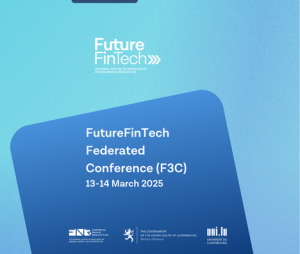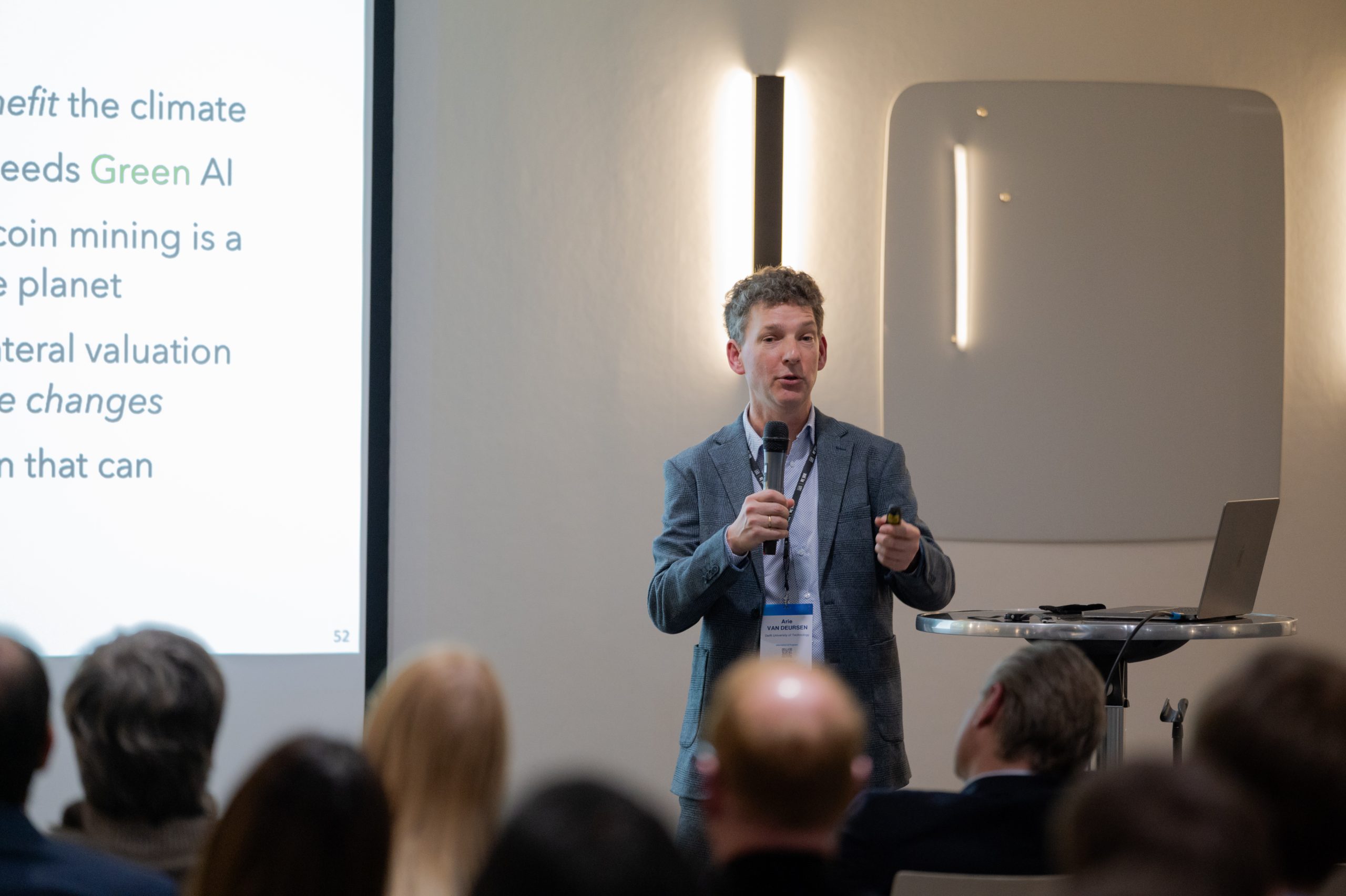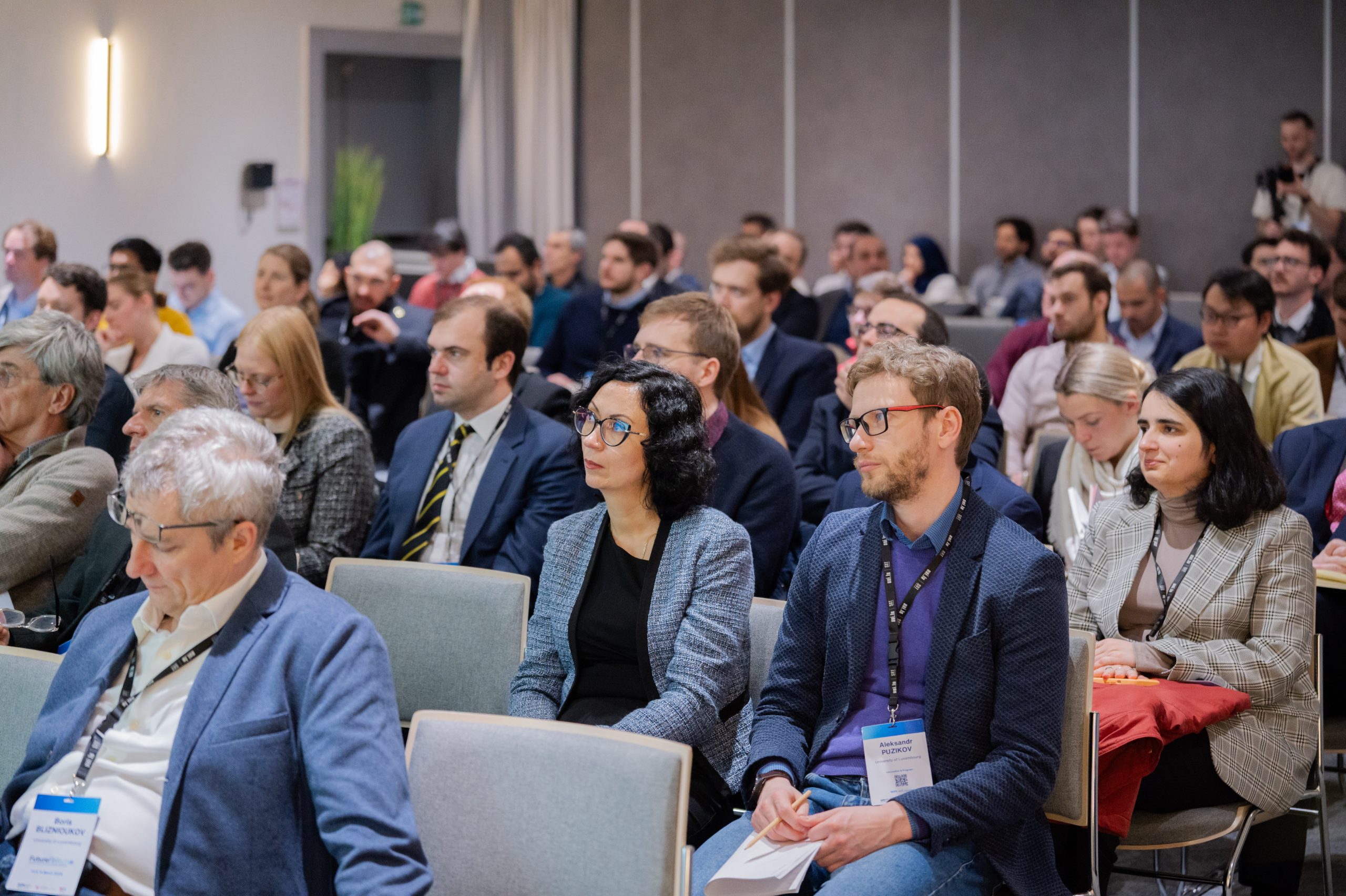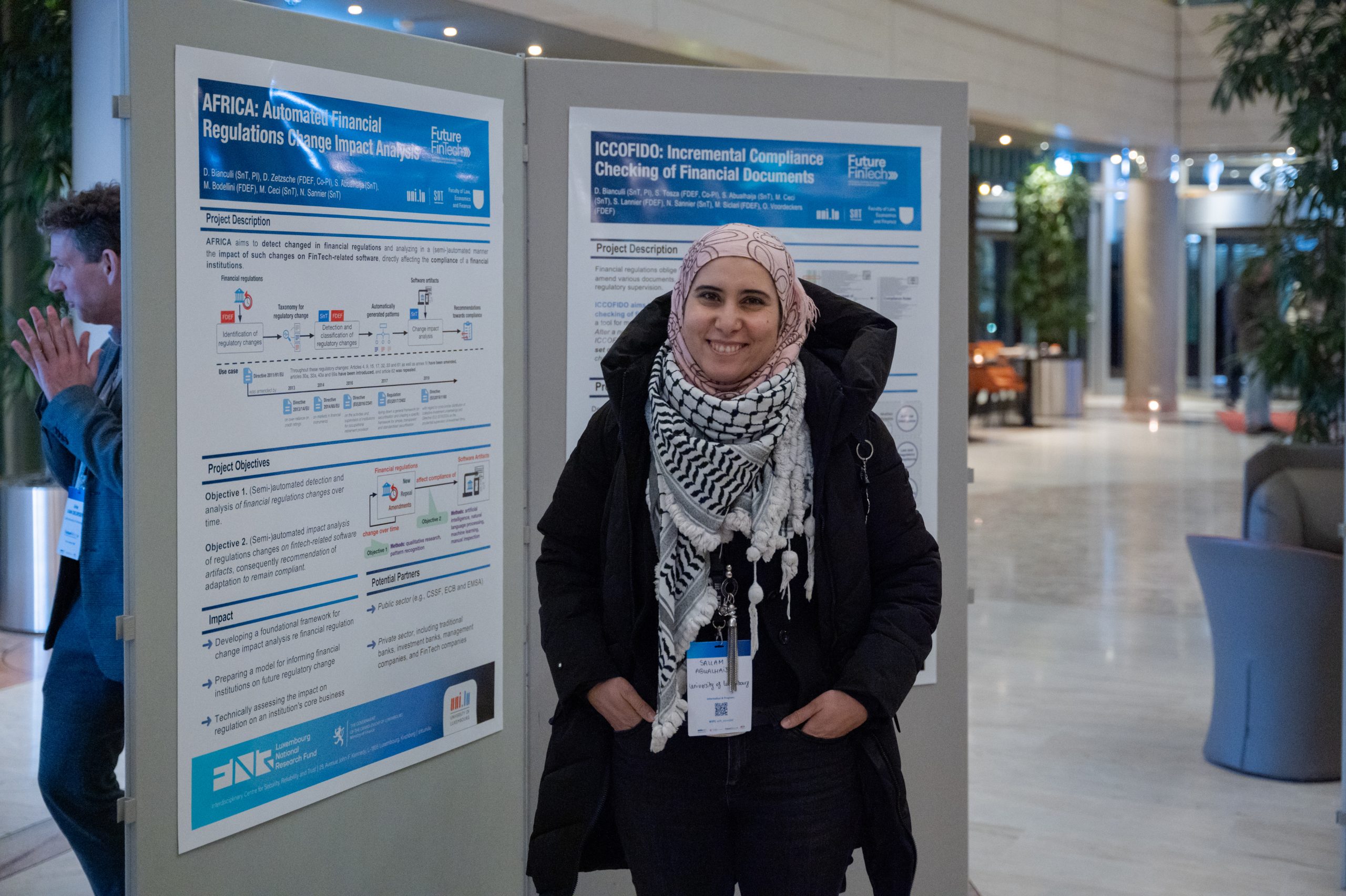The FutureFinTech Conference (F3C2025) was held March 13-14 at the Novotel Kirchberg in Luxembourg, bringing together experts and innovators from across the spectrum of financial technology.
Background and event structure
The federated structure of the conference was particularly effective in promoting interdisciplinary collaboration. This structure enabled specialists from diverse fields to deeply engage in their particular areas of expertise while seamlessly connecting over shared interests during joint sessions and networking breaks.
The conference comprised four co-located subconferences:
- AI and Software Engineering
- Finance
- Information Systems
- Law
Each subconference offered focused discussions and presentations, complemented by plenary sessions that fostered valuable cross-disciplinary exchanges.
‟ “We’re attempting something rather different here. Financial technology isn’t simply a technical challenge or a regulatory puzzle, it’s both and much more. The future of finance demands conversation across boundaries.”

Professor in Digital Financial Services / Paypal-FNR PEARL Chair
Subconference highlights
AI and Software Engineering sessions
The AI and Software Engineering sessions examined how artificial intelligence and automation are fundamentally reshaping regulatory compliance processes within financial services and legal sectors. Key discussions included the concept of a RegTech innovation lab designed to facilitate collaboration between traditionally isolated groups: regulators, established financial institutions, and innovative fintech start-ups.
Continuing this theme, Preethu Rose Anish from TCS Research gave a demonstration of the Contractual Obligation Governance System (COGS). Anish showed how automation significantly enhances the management of complex contractual obligations, transforming weeks of manual labour into tasks completed in mere hours. The integration of GDPR compliance into software development workflows was also discussed, demonstrating how AI can streamline regulatory processes.
Another major theme explored was the use of synthetic data in anti-money laundering (AML) and financial crime model training, presented by Dr George Samakovitis, University of Greenwich. This innovative approach addresses privacy concerns and facilitates secure data sharing, significantly impacting compliance effectiveness.
Perhaps the most tangible example of academic-industry partnership came from the University of Luxembourg’s Jordan Samhi. His team’s work with BGL BNP Paribas showcased how natural language processing could transform compliance processes in a major financial institution – technology moving from theory to practice in real time.
Researchers also discussed the use of synthetic data for anti-money laundering model training and tools to integrate GDPR compliance into software development workflows.
Finance sessions
The Finance track focused on the transformative role of AI in asset management and broader financial decision-making processes. Presenters discussed how non-traditional data sources, such as satellite imagery and behavioural market indicators, could enhance investment decisions and risk management strategies. The prevailing view was that AI serves to augment, not replace, human judgment and traditional financial methodologies.
Further discussions addressed the emerging domain of digital assets, including cryptocurrencies, digital art, and central bank digital currencies (CBDCs). A critical focus was determining whether digital assets can transcend speculative investments to become stable financial instruments with inherent value, comparable to traditionally “safe” assets like government bonds.
Information Systems sessions
The Information Systems session began with Professor Roman Beck from Bentley University, US discussing how blockchain technology acts as a facilitator of a global “community logic,” enabling cooperation across diverse geographical and institutional boundaries. Dr Jonathan Heiss from TU Berlin expanded on these ideas, focusing on the critical role of trust in data-driven, decentralised collaborations. Meanwhile, Dr Olivier Rikken from Delft University of Technology provided valuable insights into Decentralised Autonomous Organisations (DAOs), framing them as essential components of emerging Web3 fintech ecosystems.
The second session explored digital innovation and its adoption within financial systems. Professor Stefan Seidel from the University of Cologne explained how stakeholders gradually shape regulations for emerging technologies by making sense of them together over time. Professors Nadine Ostern, Queensland University of Technology, AUS and Marleen Vöß, University Muenster emphasised benevolence as an often-overlooked yet crucial element influencing the adoption and sustained use of financial technologies.
On the last day, Professor Rainer Alt from Leipzig University discussed fintech’s evolution, driven by converging technologies, innovative financial services, and broader changes within the financial sector.
Law sessions
The law sessions explored artificial intelligence’s role and regulation across financial markets through three focused sessions: AI in the Boardroom, AI in Financial Services, and AI in Risk Management.
In the first session, professors from three continents shared diverse regulatory perspectives. Professor Aurelio Gurrea Martínez, Singapore Management University, Professor Douglas Arner, Hong Kong University, and Professor Dirk Zetzsche, University of Luxembourg, presented on AI applications in corporate decision-making and the opportunities and limitations of automated “CorpTech” solutions. Their presentations highlighted how regulators in Singapore, Hong Kong, and Europe approach these challenges differently. Zoé Wagner from Schiltz & Schiltz SA complemented these insights with a Luxembourg perspective.
The second session turned to AI’s impact on specific financial sectors. Gonzalo Fernandez Dionis and Gabriela Conde Vitueira from the International Monetary Fund discussed AI’s effects on capital markets, while Pavle Avramovic from the Cambridge Centre for Alternative Finance offered a market-oriented view of AI applications. Professor Luc Grynbaum from the University of Luxembourg focused on AI’s implications for insurance law, with Dr. Salomé Lannier synthesising these presentations and drawing connections across the different legal domains.
The final session addressed AI’s challenges to risk management, anti-money laundering compliance, and systemic risk. University of Luxembourg professors Dr. Felix Pflücke, Stanislaw Tosza, and Julia Sinnig, along with Assistant Professor Nydia Remolina Leon from Singapore Management University, compared regulatory approaches across jurisdictions. Their discussions revealed both emerging opportunities and regulatory gaps that need addressing.
A consensus emerged across all sessions: while AI creates significant efficiency gains, it won’t replace humans and value-based judgement. The speakers emphasised that AI applications raise important liability questions and require thoughtful regulation that balances protection with innovation.
Deep Dives from Global Experts
Professor Arie van Deursen from TU Delft discussed his five-year collaboration with ING Bank, highlighting how software engineering faces unique challenges in the financial sector.
“Financial technology isn’t merely about algorithms and data,” van Deursen began, gesturing to a slide showing a confused bank customer. “It’s about creating systems that remain intelligible to the humans who ultimately use and are affected by them.”
Emphasising the need for transparency and explainability in financial technology, van Deursen underscored compliance with the EU’s Digital Operational Resilience Act (DORA), which mandates clearer explanations of automated financial decisions.
‟ The regulatory landscape is changing, and explainability isn’t optional, it’s becoming a requirement.”
The following day, Professor David Yermack from NYU Stern delivered what many would later describe as a masterclass in regulatory analysis.
“Four billion dollars in U.S. Treasury bonds have now been tokenized,” he revealed, pausing to let the figure sink in. “That’s a six-fold increase from just a year ago. This isn’t speculative cryptocurrency – this is the world’s most stable asset being transformed by blockchain technology.”
Yermack critiqued the overly restrictive regulatory approaches by the U.S. Securities and Exchange Commission (SEC), contrasting them with more progressive frameworks in the EU, UAE, and Singapore. He emphasised the need for balanced regulatory policies that encourage innovation while protecting consumers.
‟ We’re witnessing a regulatory experiment play out in real time. The jurisdictions that find the right balance between protection and innovation will likely become the financial centres of the future.”
Key insights and future directions
The FutureFinTech Conference identified five significant themes guiding future fintech development:
- Trust Transformation in Financial Systems: Blockchain and other decentralised technologies are redefining trust, extending it beyond traditional institutional structures.
- Maturation of fintech ecosystems: The fintech landscape is maturing, marked by the convergence of advanced technologies like quantum computing, Internet of Things (IoT), and financial services innovations, including tokenisation and robo-advisory.
- AI enhances rather than replaces human expertise: AI bridges the gap between complex regulations and practical implementation. Tools that embed compliance into software development workflows reduce regulatory burden while maintaining standards.
- Establishing Fundamental Value in Digital Assets: The digital asset market must evolve from speculative investment to stable, inherently valuable financial tools, ensuring broader institutional adoption.
- Cross-Sector Collaboration: Innovation thrives through structured interdisciplinary collaboration across technology, finance, and regulatory sectors, accelerating meaningful innovation and compliance.
Moving forward
The insights from F3C2025 provide a roadmap for researchers, practitioners, and policymakers navigating the complex intersection of technology, finance, and regulation. As financial technology enters its maturity phase, the focus shifts from disruptive innovation to thoughtful integration with existing financial systems.
The conference highlighted how federated structures facilitate valuable interdisciplinary connections. These collaborative networks hope to drive the next wave of financial technology innovation, addressing challenges like regulatory compliance, trust in distributed systems, and the evolution of digital assets.
We look forward to continued collaboration and invite interested researchers to future FutureFinTech events, where ongoing discussions can further enrich the fintech ecosystem.
–
About FutureFinTech
FutureFinTech, founded by researchers from the Interdisciplinary Centre for Security, Reliability and Trust (SnT) and the Faculty of Law, Economics and Finance (FDEF) at the University of Luxembourg, takes a holistic approach to fintech innovation. By combining technical expertise with financial knowledge and regulatory understanding, FutureFinTech develops practical solutions that address real-world needs in our rapidly evolving financial landscape.
FutureFinTech is supported by the Luxembourg National Research Fund and the Ministry of Finance.




